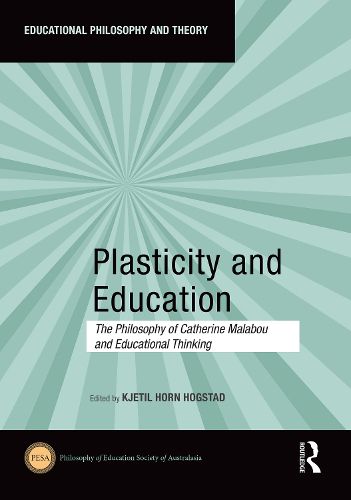Readings Newsletter
Become a Readings Member to make your shopping experience even easier.
Sign in or sign up for free!
You’re not far away from qualifying for FREE standard shipping within Australia
You’ve qualified for FREE standard shipping within Australia
The cart is loading…






This book explores the engagement between the philosophical concept of 'plasticity' and the radically changing space of educational thinking.
Plasticity is a central concept in the philosophy of Catherine Malabou. It represents a new metaphor for the space between the creation, resistance, and total dissolution of form. Plasticity designates the most prominent feature of the human being: the feature of shaping itself, receiving shape from outside, continually changing yet always indebted to its history. Differing from the formlessness of 'flexibility' - the notion that form can change into anything without resistance or consequence - plasticity represents a radical restructuring of our ideas of development and change. According to plasticity, the cause and space for change are found inside of form itself, and form accumulates form over time.
In other words, our biological body is both what changes and what causes change, but whatever change happens gives shape to what is to come later. In this way, plasticity formulates a new relationship between body and soul, matter and symbolism, brain and thinking. Their meeting space is represented metaphorically by the brain, the plastic organ par excellence.
Highly pertinent to educators, plasticity provides a new conceptualisation of the possibility of being and becoming. This book rethinks some of the fundamental issues in philosophy of education, among them power, rationality, subjectivity, ideas of childhood, of life itself, truth, and intelligence. This book is a collection of a special issue of the journal Educational Philosophy and Theory and two new chapters.
$9.00 standard shipping within Australia
FREE standard shipping within Australia for orders over $100.00
Express & International shipping calculated at checkout
This book explores the engagement between the philosophical concept of 'plasticity' and the radically changing space of educational thinking.
Plasticity is a central concept in the philosophy of Catherine Malabou. It represents a new metaphor for the space between the creation, resistance, and total dissolution of form. Plasticity designates the most prominent feature of the human being: the feature of shaping itself, receiving shape from outside, continually changing yet always indebted to its history. Differing from the formlessness of 'flexibility' - the notion that form can change into anything without resistance or consequence - plasticity represents a radical restructuring of our ideas of development and change. According to plasticity, the cause and space for change are found inside of form itself, and form accumulates form over time.
In other words, our biological body is both what changes and what causes change, but whatever change happens gives shape to what is to come later. In this way, plasticity formulates a new relationship between body and soul, matter and symbolism, brain and thinking. Their meeting space is represented metaphorically by the brain, the plastic organ par excellence.
Highly pertinent to educators, plasticity provides a new conceptualisation of the possibility of being and becoming. This book rethinks some of the fundamental issues in philosophy of education, among them power, rationality, subjectivity, ideas of childhood, of life itself, truth, and intelligence. This book is a collection of a special issue of the journal Educational Philosophy and Theory and two new chapters.